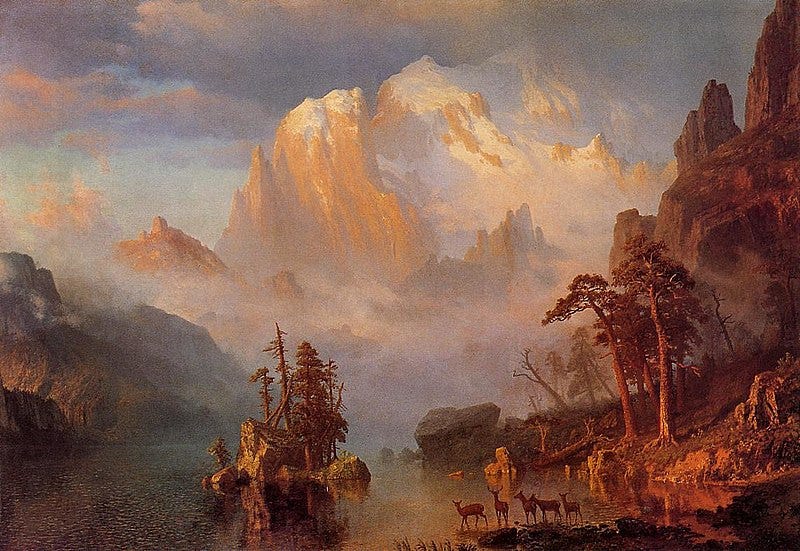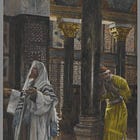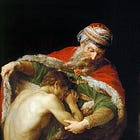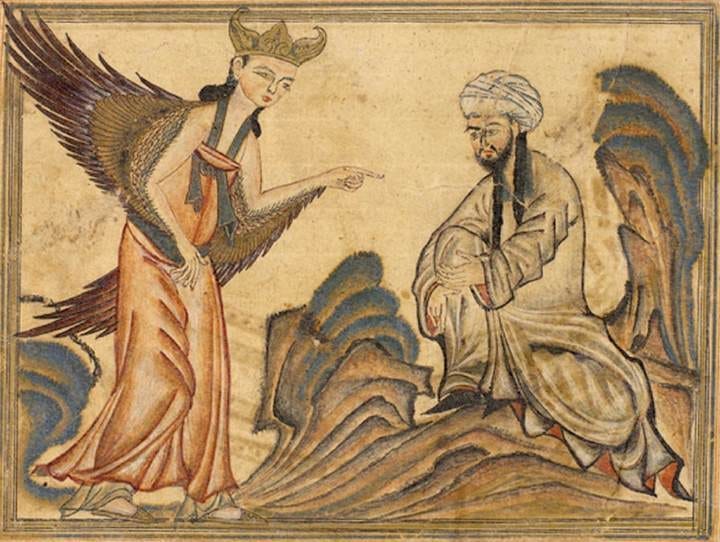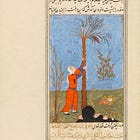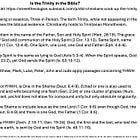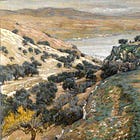Heaping Muslim Sins on Christians: Atonement in Islam?
Will some Muslims enter Paradise by getting their sins as large as mountains heaped on Christians in hell?
2 Corinthians 5:21: For our sake he made him to be sin who knew no sin, so that in him we might become the righteousness of God.
Matthew 20:28: Even as the Son of Man came not to be served but to serve, and to give his life as a ransom for many.
Find us on Medium.com
Or Twitter
https://twitter.com/StreetTheologn
Or Insta:
instagram.com/streettheologianapologetics/
Atonement
The concept of atonement as the Stanford Encyclopedia of Philosophy notes, deals with at-one-ment or how be made one (reconciled) or made right with God. For Christians Jesus offers an atoning sacrifice for the sins of those who trust in Him.
In Christianity, you cannot work your way to God. Fallen creatures cannot work their way to a Perfect God. As such, God’s judgement and wrath awaits us. Unless there is someone perfect who can take our place and bear God’s judgement on our behalf. Jesus.
Jesus as truly divine and truly human is able to bridge the way to God through His perfection. Jesus’ death on the cross is accepted even by atheist and agnostic historians as one of the best attested facts in ancient history. Jesus’ death is where Jesus takes on divine judgement in the place of fallen humans for the sin of fallen humans.
Even in the Qur’an, there is some indication Jesus may have died despite the common interpretation of Surah 4:157. In Surah 3:55 and 5:117 the word tawaffa which is a reference to death in Arabic is applied to Jesus.
Everyone impure except Jesus?
According to Sahih Bukari Volume 4, Book 54, Hadith 506, “When any human being is born, Satan touches him at both sides of the body with his two fingers, except Jesus, the son of Mary, whom Satan tried to touch but failed, for he touched the placenta-cover instead.”
As such, in Islam, evil has an impact on human life from birth, with the exception of Jesus.
Moreover, Surah 3:46 says concerning Jesus:
He will speak to the people in the cradle and in maturity and will be of the righteous.
Jesus is also said to be of the righteous in Surah 6:85 along with Zechariah, John and Elias.
Surah 3:35 describes Jesus as a “pure boy”.
Dr. Power explains in Engaging Islamic Traditions:
Christ is understood in the Islamic texts as being without fault from the moment of his birth. The angel Gabriel declared to Mary: “I am but a messenger from your Lord to give you a boy most pure (Surah 3:35).” The expression “most pure” means blameless, guiltless and sinless according to the Muslim scholars al-Baidawi, al-Tabari and al-Zamakhshari. The classical commentator Fakhr al-Din al-Razi (d. 606/1209) stated: “Faultless (zakiyyan) means three things: First, that he is without sin; secondly that he grew in integrity, as it is said that he who has no sin is chaste and in the growing plant there is purity; thirdly, he was above reproach and pure (Person of Christ, 10).”
What makes you confident God will accept you?
The question of assurance of salvation is a very significant question.
The Bible is clear everyone will die for their own sin (Jer. 31:30).
Romans 6:23: For the wages of sin is death, but the free gift of God is eternal life in Christ Jesus our Lord.
Jesus taught evil intentions come out of the human heart.
Matthew 15:18-19: But what comes out of the mouth proceeds from the heart, and this defiles a person. 19 For out of the heart come evil thoughts, murder, adultery, sexual immorality, theft, false witness, slander.
Assurance of salvation in Perfect Jesus
As such, we are reliant on Jesus to save us through an act of mercy when we put our trust in Him.
Titus 3:4-7: But when the goodness and loving kindness of God our Savior appeared, 5 he saved us, not because of works done by us in righteousness, but according to his own mercy, by the washing of regeneration and renewal of the Holy Spirit, 6 whom he poured out on us richly through Jesus Christ our Savior, 7 so that being justified by his grace we might become heirs according to the hope of eternal life.
The need for mercy in Islam
Hadith literature also teaches entrance into paradise is dependant on Allah’s mercy.
Sahih Bukhari Volume 6, Book 60, Hadith Number 373: Narrated By Abu Huraira : The Prophet said, “Paradise and the Fire (Hell) argued, and the Fire (Hell) said, “I have been given the privilege of receiving the arrogant and the tyrants.’ Paradise said, ‘What is the matter with me? Why do only the weak and the humble among the people enter me?’ On that, Allah said to Paradise. ‘You are My Mercy which I bestow on whoever I wish of my servants.’ Then Allah said to the (Hell) Fire, ‘You are my (means of) punishment by which I punish whoever I wish of my slaves. And each of you will have its fill.’ As for the Fire (Hell), it will not be filled till Allah puts His Foot over it whereupon it will say, ‘Qati! Qati!’ At that time it will be filled, and its different parts will come closer to each other; and Allah will not wrong any of His created beings. As regards Paradise, Allah will create a new creation to fill it with.”
Being good or bad doesn’t necessarily determine your eternal destiny in Islam
Sahih al-Bukhari 4202: Allah's Messenger then said, "A man may do what seem to the people as the deeds of the dwellers of Paradise but he is from the dwellers of the Hell-Fire and another may do what seem to the people as the deeds of the dwellers of the Hell- Fire, but he is from the dwellers of Paradise."
A single good act of yourself to get you into heaven?
However, there were times Muhammad indicated a single act could get you into paradise.
In Bukhari 3:894:
Allah's Apostle said, "Allah has ninety-nine names, i.e. one-hundred minus one, and whoever knows them will go to Paradise."
A constant state of uncertainty?
Dr. Power visually demonstrates what the flux between the promise of forgiveness and reward and the threat of condemnation could look like in the life of a Muslim.
Dr. Bernie Power: Engaging Islamic Traditions p.92
Muhammad needed to seek refuge in Allah to try and avoid hell
Sahih Muslim 589: The Apostle of Allah used to supplicate in prayer thus:" O Allah! I seek refuge with Thee from the torment of the grave, and I seek refuge with Thee from the trial of the Masih al-Dajjal (Antichrist) and I seek refuge with Thee from the trial of life and death. O Allah! I seek refuge with Thee from sin and debt."
Muhammad’s heart needed cleansing indicating he had imperfections
Bukhari 1:345: Allah's Apostle said, "While I was at Mecca the roof of my house was opened and Gabriel descended, opened my chest, and washed it with Zam-zam water. Then he brought a golden tray full of wisdom and faith and having poured its contents into my chest, he closed it.
Muhammad asked for forgiveness over 70 times per day
In Sahih al-Bukahri 6307, Muhammad says: By Allah! I ask for forgiveness from Allah and turn to Him in repentance more than seventy times a day."
At times, Muhammad wouldn’t know where he would end up when he died
Muhammad says in Sahih al-Bukhari 3929 regarding the state of the deceased: By Allah, though I am the Apostle of Allah, yet I do not know what Allah will do to me.
Muhammad, at least at times, didn’t know what Allah would do with him or his followers
Surah 46:9 says, "I am not something original among the messengers, nor do I know what will be done with me or with you. I only follow that which is revealed to me, and I am not but a clear warner."
Muhammad could not save his followers from Allah’s punishment
Note the following in Bukhari 4:16:
Narrated Abu Huraira: When Allah revealed the Verse: "Warn your nearest kinsmen," Allah's Apostle got up and said, "O people of Quraish (or said similar words)! Buy (i.e. save) yourselves (from the Hellfire) as I cannot save you from Allah's Punishment; O Bani Abd Manaf! I cannot save you from Allah's Punishment, O Safiya, the Aunt of Allah's Apostle! I cannot save you from Allah's Punishment; O Fatima bint Muhammad!
Ask me anything from my wealth, but I cannot save you from Allah's Punishment."
When Muhammad got close to hell
Dr. Power explains in Engaging Islamic Traditions p.98:
Due to performing ruqya (reciting Qur’anic verses over the sick), B.7:640, 642. Muhammad had apparently disqualified himself from being among the 70,000 Muslims guaranteed Paradise “who will neither have any reckoning of their accounts nor will receive any punishment”. B.8:549, 479; 7:648; 8:549, 550. After a vision, he noted: “Hell became so near to me that I said, ‘O my Lord, will I be among those people?’” B.1:712; 3:552.
What is the way forward?
For many Muslims, it would seem there is no clear way forward and that no one will take the place of their sins and suffer for them. Muslims such as Muhammad Hijab will often mock the Christian doctrine of the atonement claiming it encourages humans to be irresponsible and take no accountability for their sin.
We have dealt with this misconception in other articles:
Let’s be clear, however, if we all got what we deserved it would be God’s judgement and separation from him.
However, there are some passages in the Hadith that indicate Christians will bear the punishment for the sin of some Muslims. This indicates concepts similar to the atonement are less foreign to Islam than many Muslims might think.
Does a Christian pay the price for a Muslim’s sins in hell?
Sahih Muslim Book - 49, Hadith - 7011 reads:
It was narrated that Abu Musa said: "The Messenger of Allah (s.a.w) said: 'When the Day of Resurrection comes, Allah, Glorified and Exalted is He, will give every Muslim a Jew or a Christian, and He will say: "This is your ransom from the Fire."
In other words, a Jew or a Christian is a Muslim’s ransom from hell.
Sahih Muslim Book - 49, Hadith - 7012 reads: "No Muslim man dies but Allah causes a Jew or a Christian to enter the Fire in his stead."
Sins as large as mountains heaped on Christians?
Sahih Muslim Book - 49, Hadith - 7014: It was narrated from Abu Burdah from his father that the Prophet (s.a.w) said: "On the Day of Resurrection some Muslim people will come with sins like mountains, but Allah will forgive them and will place them (the sins) on the Jews and the Christians."
110 Ahadith Qudsi no 8 reads:
Allah's Messenger (PBUH) said: On the Day of Resurrection, my Ummah (nation) will be gathered into three groups. one sort will enter Paradise without rendering an account (of their deeds). Another sort will be reckoned an easy account and admitted into Paradise. Yet another sort will come bearing on their backs heaps of sins like great mountains. Allah will ask the angels though He knows best about them: Who are these people? They will reply: They are humble slaves of yours. He will say: Unload the sins from them and put the same over the Jews and Christians; then let the humble slaves get into Paradise by virtue of My Mercy.
Thus, the idea of someone paying for the sins of another is not completely foreign to Islam.
The big question
The question becomes will you hope your sins are heaped on some Christian in hell who is sinful themselves, or perhaps hope Allah will be merciful on you seeing your good works and effort or perhaps will you turn to Christianity where Jesus as the Perfect and the Righteous takes your place so you don’t have to suffer the consequences for your sin?
Luke 19:10: For the Son of Man came to seek and to save the lost.
Find us on Medium.com
Or Twitter
https://twitter.com/StreetTheologn




